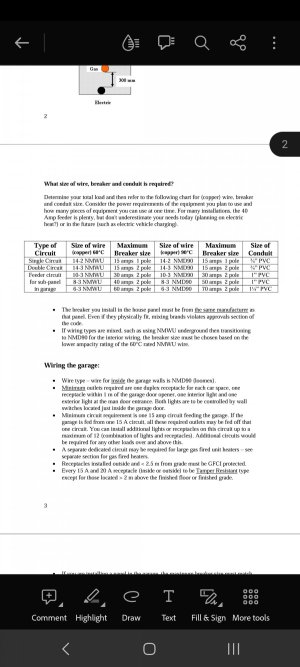Jswain
Joe
I have a question about upgrading the breaker running to my garage from the current 40a to a 50a. I believe the wiring is all good to do so according to CEC but would like better verification.
It's a detached laned home garage. 100a main panel in basement, 8/3nmd90 ~30ft inside home. 8awg rw90 x3 in ~45ft conduit underground to garage. 8/3nmd90 inside garage ~20ft.
I believe 6/3 used to be what would be accepted until ~2012? And now 8/3 is acceptable because it is good for 50a @75c however reading the internet it's a 50/50 yes/no and although I did download a copy of the CEC it's so large and I have no idea which table to look at.
Home is in Cochrane, Alberta if it differs from province to province. Here's a photo for detached wiring for Airdrie which is about all I could find but makes me believe 50a is acceptable with the nmd90/rw90 combo
It's a detached laned home garage. 100a main panel in basement, 8/3nmd90 ~30ft inside home. 8awg rw90 x3 in ~45ft conduit underground to garage. 8/3nmd90 inside garage ~20ft.
I believe 6/3 used to be what would be accepted until ~2012? And now 8/3 is acceptable because it is good for 50a @75c however reading the internet it's a 50/50 yes/no and although I did download a copy of the CEC it's so large and I have no idea which table to look at.
Home is in Cochrane, Alberta if it differs from province to province. Here's a photo for detached wiring for Airdrie which is about all I could find but makes me believe 50a is acceptable with the nmd90/rw90 combo

